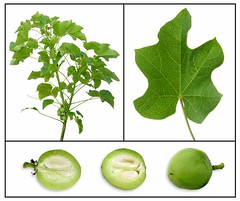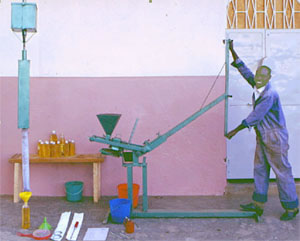By Robert Miller on Saturday, April 14, 2007.
 Recently, Wyclef Jean went to Capitol Hill to discuss Haiti's longterm developmental needs. His visit incited a rarely seen attendance at a subcommittee hearing and elicited some great reactions from the public. Dr. Johanna Mendelson Forman of the Center for Strategic and International Study, who we've mentioned before [ link], submitted testimony for the record.
Recently, Wyclef Jean went to Capitol Hill to discuss Haiti's longterm developmental needs. His visit incited a rarely seen attendance at a subcommittee hearing and elicited some great reactions from the public. Dr. Johanna Mendelson Forman of the Center for Strategic and International Study, who we've mentioned before [ link], submitted testimony for the record.
Below, I have transcribed a small portion of her comments and then linked to a pdf file containing the complete testimony. You will also find mention of the Jatropha plant in the Inter-American Development Bank's recently published biofuels report in the section on Haiti [ link].
Also, I spoke on panel at the US Institute of Peace yesterday (see my previous blog post [link]) and Haitian Ambassador to the United States Raymond Joseph raised the issue of biofuel production--and Jatropha in particular--in his opening remarks.
At long last, it seems Jatropha and biofuels are receiving the attention and clout they deserve. Please see below for Dr. Forman's helpful overview of Jatropha in Haiti.
Follow this link to go directly to the full testimony [link ].
Why Jatropha?
"Jatropha curcas is an important feedstock for the production of biofuels. Its widespread use in India and Egypt is gaining popularity as a quick growing source of oil-bearing nuts that can be pressed to produce biodiesel products. Jatropha has also been a crop of choice in development programs in Africa where local villages have grown Jatropha on small plots of land and have hand-pressed the oil for use in generators, sewing machines and small motors. Glycerin, a by product of Jatropha oil, can also be used to produce soap.
"Jatropha has also been proven to have strong anti-erosion qualities which make it ideally suited for use in Haiti. A recent study on watershed preservation commissioned by USAID this year reinforced this fact, adding that it was more effective than the tree-planing efforts that have been used to help reforest Haiti.
Follow this link to read the complete text [link].
Seed Oil Technology
 While in Peace Corps, I discovered a firm, then called Approtech (short for Appropriate Technology), now called Kick-Start [link] that made innovated machines simple enough for domestic production and rural maintenance, and at the same time--and probably most importantly--able to get the job done at prices readily covered by micro-credit loans.
While in Peace Corps, I discovered a firm, then called Approtech (short for Appropriate Technology), now called Kick-Start [link] that made innovated machines simple enough for domestic production and rural maintenance, and at the same time--and probably most importantly--able to get the job done at prices readily covered by micro-credit loans.
Because we are talking Jatropha, I wanted to point out the Kick Start Oil Press [link], which will extract oil from sunflower, sesame, and other oil seeds. The filter produces clear, cold-pressed, cooking oil ready for direct sale, biofuel processing (Jatropha), or consumption (when used with other seed oils).
Micro Credit Lending
 While the press would by no means be cheep to a Haiti farmer, there are numerous organization in Haiti that offer small loans to jump-start small businesses. FONKOZE, which is short for Fondasyon Kole Zepol, or Shoulders Stuck Together, is probably the most well-known and respected micro credit lending institution in Haiti. More information on FONKOZE can be found on their website [ link].
While the press would by no means be cheep to a Haiti farmer, there are numerous organization in Haiti that offer small loans to jump-start small businesses. FONKOZE, which is short for Fondasyon Kole Zepol, or Shoulders Stuck Together, is probably the most well-known and respected micro credit lending institution in Haiti. More information on FONKOZE can be found on their website [ link].
The second organization, which has the market share of the Western Hemisphere is FINCA. While predominantly in Central and Latin America, FINCA does have an evolving presence in Haiti. They too offer small business loans and can be considered the powerhouse of micro-credit in the region. Information can be found on their website [ link].